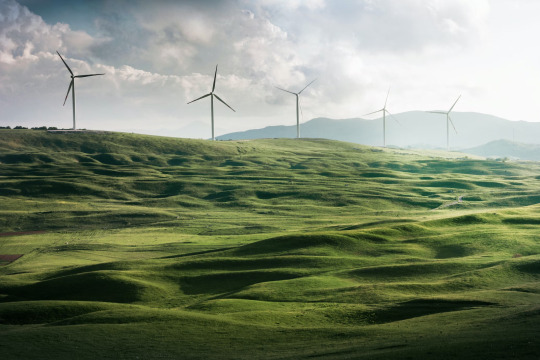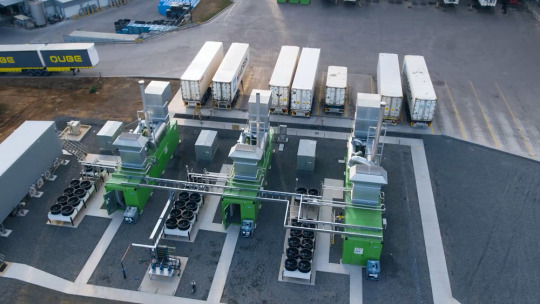Don't wanna be here? Send us removal request.
Text
The Future is Green: Biogas Power Generation Innovations

Understanding Biogas Power Generation
Biogas Basics
Biogas, a renewable energy source, is produced through the anaerobic digestion of organic matter. This process involves the breakdown of biodegradable materials, such as agricultural residues, organic waste, and sewage, by microorganisms in an oxygen-starved environment. The result is a mixture of gases, primarily methane and carbon dioxide, which can be harnessed for power generation.
Environmental Benefits
One of the key attractions of biogas power generation is its minimal environmental impact. Unlike traditional fossil fuels, burning biogas releases significantly fewer greenhouse gases, contributing to the mitigation of climate change. Additionally, the process of anaerobic digestion helps manage organic waste, reducing the burden on landfills and curbing methane emissions.
Innovations Shaping the Biogas Landscape
Advanced Anaerobic Digestion Techniques
In the pursuit of efficiency, researchers and engineers are continuously refining anaerobic digestion processes. Advanced techniques, such as dry fermentation and two-stage anaerobic digestion, enhance gas yields and shorten digestion periods. These innovations not only improve energy output but also optimize resource utilization.
Integration with Smart Grids
The integration of biogas power generation into smart grids marks a revolutionary step towards a more resilient and interconnected energy infrastructure. Smart grids enable real-time monitoring and control, ensuring efficient energy distribution and utilization. By seamlessly integrating biogas into these grids, we enhance the stability and reliability of our energy systems.
Microbial Fuel Cells: A Cutting-Edge Approach
Microbial fuel cells (MFCs) represent a cutting-edge approach within the biogas landscape. These devices harness the metabolic activity of microorganisms to generate electricity directly from organic matter. MFCs not only enhance energy production efficiency but also offer a sustainable solution for decentralized power generation in remote or off-grid areas.
Advantages of Biogas Power Generation
Renewable and Sustainable
Biogas is a truly renewable and sustainable energy source. As long as organic waste exists, the potential for biogas production persists. This makes biogas a reliable and perpetual source of clean energy, contributing to long-term energy security.
Waste Management
Beyond energy production, biogas plays a crucial role in waste management. By diverting organic waste from landfills and converting it into energy, we address two environmental challenges simultaneously. This dual-benefit approach aligns with the principles of circular economy and environmental sustainability.
Economic Opportunities
Investing in biogas power generation not only yields environmental benefits but also creates economic opportunities. The establishment of biogas plants generates employment, fosters local development, and contributes to a more resilient and diversified energy sector.
Conclusion: Embracing the Green Revolution
In conclusion, the future of energy lies in embracing innovative solutions that prioritize environmental sustainability. Biogas power generation, with its advancements and inherent benefits, emerges as a frontrunner in this green revolution. As we witness the evolution of biogas technologies, it becomes evident that this eco-friendly energy source has the potential to reshape our energy landscape for the better.
0 notes
Text
From Waste to Wealth: The Green Revolution of Biogas Power Generation

Harnessing Energy from Waste
Turning Waste into a Valuable Resource
Biogas is a renewable energy source produced through the breakdown of organic matter in the absence of oxygen. This process, known as anaerobic digestion, involves microorganisms breaking down biodegradable materials, such as agricultural residues, food waste, and sewage sludge. The result? Methane-rich biogas that can be harnessed to generate power.
The Mechanism Behind the Green Magic
The heart of biogas production lies in the anaerobic digester. This sealed container provides an oxygen-free environment where bacteria thrive, breaking down organic matter and releasing methane gas. The captured methane can then be used for power generation, either through direct combustion or by running a generator.
Environmental Benefits of Biogas Power Generation
Mitigating Greenhouse Gas Emissions
One of the primary advantages of biogas is its role in reducing greenhouse gas emissions. Unlike traditional waste disposal methods, which release harmful methane into the atmosphere, biogas systems capture and utilize this potent greenhouse gas. By converting methane into a valuable energy source, we not only prevent its release but also contribute to a substantial reduction in overall carbon footprint.
Waste Management Redefined
Biogas power generation is a game-changer in waste management. Instead of viewing organic waste as a burden, it becomes a valuable resource. Farms, wastewater treatment plants, and even households can adopt biogas systems to efficiently manage their waste while simultaneously producing a clean and renewable energy source.
The Economic Viability of Biogas
Cost-Effective and Sustainable
Beyond its environmental benefits, biogas power generation makes economic sense. The initial investment in setting up a biogas plant may seem substantial, but the long-term gains far outweigh the costs. The continuous generation of electricity or heat, coupled with the potential for selling excess power back to the grid, positions biogas as a financially sound and sustainable energy solution.
Empowering Agriculture
For agricultural communities, biogas systems offer a dual advantage. Not only do they provide a reliable source of energy, reducing dependence on conventional power sources, but they also utilize agricultural residues as feedstock. This symbiotic relationship creates a closed-loop system where farms become both producers and consumers of energy.
The Future of Biogas Power Generation
Technological Advancements
As technology advances, so does the efficiency and applicability of biogas power generation. Innovations in digester design, optimization of feedstock, and integration with other renewable energy sources contribute to a more robust and versatile system. The continuous evolution of biogas technology positions it as a frontrunner in the race towards sustainable energy solutions.
Global Adoption and Awareness
The green revolution sparked by biogas is not limited to a few regions. Countries worldwide are recognizing the potential of biogas as a clean and reliable energy source. Government initiatives, subsidies, and awareness campaigns are driving the widespread adoption of biogas systems, further solidifying its place in the global energy landscape.
Conclusion
In the journey from waste to wealth, biogas power generation emerges as a beacon of sustainability and innovation. Its ability to transform organic waste into a valuable energy resource, coupled with environmental and economic benefits, positions it as a key player in the quest for greener energy solutions. As we look ahead, the future of biogas appears promising, heralding a new era where waste not only becomes a resource but also a catalyst for a cleaner, more sustainable world.
0 notes
Text
Biogas Power Generation

Join the Green Revolution: Evo Energy Technologies' Biogas – your step towards a cleaner, greener, and powered future. #BiogasPowerGeneration
1 note
·
View note